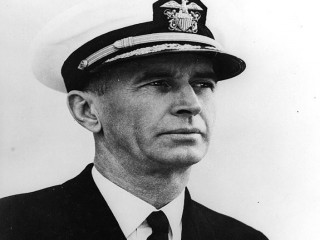
Ernest Joseph King biography
Date of birth : 1878-11-23
Date of death : 1956-06-25
Birthplace : Lorain, Ohio
Nationality : American
Category : Politics
Last modified : 2011-04-06
Credited as : Fleet admiral, U.S. Chief of Naval Operations,
Ernest Joseph King, American naval officer, was a brilliant strategist and organizer. He served as both commander in chief of the U.S. Fleet and chief of Naval Operations during World War II.
Ernest King was born on Nov. 23, 1878, in Lorain, Ohio. He developed an early interest in a naval career and entered the U.S. Naval Academy at Annapolis in 1897. He graduated in 1901, standing fourth in a class of 67.
During the next several years King was assigned to a variety of posts, including an instructorship at the Naval Academy. By 1911 his excellent record led to appointment as flag secretary to the commander in chief of the Atlantic Fleet. In 1914 he received his first command.
During World War I King served as chief of staff to the commander in chief, Atlantic Fleet, and was promoted to captain. Following the war he saw some service with submarines but concentrated on the growing area of naval aviation, graduating from flight training at the age of 48. After a tour as captain of the aircraft carrier Lexington, he was promoted to rear admiral and appointed chief of the Bureau of Aeronautics. In 1938 he became vice admiral and was assigned as commander, Aircraft, Battle Force, a position that put him in charge of all American aircraft carriers.
In June 1939 King was assigned to the General Board of the Navy, a traditional final post for senior flag officers. However, with the outbreak of World War II, he was reassigned. In January 1941 he was promoted to admiral and appointed commander in chief of the Atlantic Fleet. In this post he made major contributions to the Allied effort in the development of antisubmarine tactics in the Atlantic and also did top-level staff work with representatives of the U.S. Army and the British military services.
Following Pearl Harbor, King assumed the positions of commander in chief of the U.S. Fleet and chief of Naval Operations. Realizing that global war required major changes in the Navy's command structure, he devoted much of his energy to organizational matters. He solved some of the problems raised by the transition from battleship to carrier operations by elevating the status of aviation officers and, in 1943, by creating the post of deputy chief of Naval Operations (Air). He also stressed the acquisition of escort vessels for Atlantic convoys.
As a member of both the Joint and Combined Chiefs of Staff, King played a major role in developing Allied strategy. Although accepting the decision to defeat Germany first, he pressed for allocation of more resources to the Pacific theater. His determination to gain the maximum possible control over Pacific operations for the Navy produced numerous conflicts with Army leaders. He overcame the Army's opposition to Adm. Chester Nimitz's plan for a dual approach to Japan but was unsuccessful in substituting an attack on Formosa for Gen. Douglas MacArthur's campaign to retake the Philippines. King also championed the Navy's view that a naval blockade and air attacks could force Japan to surrender without an invasion of the home islands.
The importance of King's overall contribution should not be underestimated. Starting with the devastated fleet and shattered morale following Pearl Harbor, he directed the expansion of the U.S. Navy into the mightiest fleet in world history. He twice testified before the Senate Military Affairs Committee against unification of the Armed Forces. He retired in December 1945, having been promoted to the five-star rank of fleet admiral. He died on June 25, 1956, in Portsmouth, N.H.
















